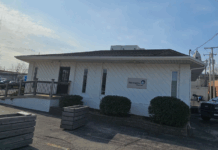Local calls made with seven digits will still work until the end of the permissive dialing period on Sunday, which was established to allow everyone time to adjust to the new dialing pattern and to make any required system changes before 10-digit dialing becomes mandatory for local calls. This six-month transition period started in April.
The change to 10-digit dialing is necessary to accommodate the “988” National Suicide Prevention Lifeline, as designated by the Federal Communications Commission (FCC). All telecommunications providers in the United States are required to implement the three-digit 988 dialing code for the national hotline by July 16, 2022. Under the FCC order, 10-digit dialing must be in place before then for any area code with a “988” prefix.
Starting this Sunday, Oct. 24, you must use 10-digit dialing for all local phone calls. After this date, if you do not use 10 digits, your call will not be completed and a recording will instruct you to hang up and dial again.
Beginning July 16, 2022, the National Suicide Prevention Lifeline will be reachable by calling the three-digit 988 code. The lifeline can be reached before and after that date at 1-800-273-TALK (8255).
The most important facts for residential consumers and businesses in these area codes to know are:
• Your telephone number, including current area code, will not change.
• You will need to dial area code plus telephone number (a total of 10 digits) for all local calls in the 219 and 574 areas.
• You will continue to dial 1 plus area code plus telephone number (a total of 11 digits) for all long-distance calls.
• Calls that are local now will remain local.
• 10-digit dialing for local calls will not change the price of a call, your coverage area or other rates and services.
• You can still dial three digits to reach 911 for emergency services.
• You can continue to dial three digits to dial 211 (social services), 411 (directory assistance), 711 (telecommunications relay service) or 811 (call to request utility locate before you dig).
• You should start including the area code together with your seven-digit local telephone numbers when providing numbers to others.
• You should make sure that all preprogrammed numbers for local calls are set to include the area code. Examples include life safety systems, medical monitoring services, PBXs, fax machines, internet dial-up numbers, alarm and security systems, gates, speed dialers, mobile/wireless phone contact lists, call forwarding settings, voicemail services and similar functions.
• You should check your website, stationery, advertising materials, personal and business checks, personal or pet ID tags and microchips and other items to ensure that the phone number includes the area code.
Any safety and security equipment, including medical alert devices and alarm systems, must be programmed for mandatory 10-digit local dialing unless the calls are already directed to toll-free or long-distance telephone numbers. If you are not sure whether your equipment needs to be reprogrammed, contact your medical alert or security provider. All necessary reprogramming must be completed before Sunday, Oct. 24.
Specific area codes in 35 states, including all four of Indiana’s neighboring states, are implementing 10-digit dialing to accommodate the 988 Lifeline.
Mandatory 10-digit dialing has been in place for several years in Indiana’s 317 and 812 area codes; it was implemented to accommodate the addition of new “overlay” area codes due to shrinking number supplies.
The 260 and 765 area codes are not affected.
A video summarizing the changes is available at https://www.youtube.com/watch?v=g6ODK_a82-Y.




